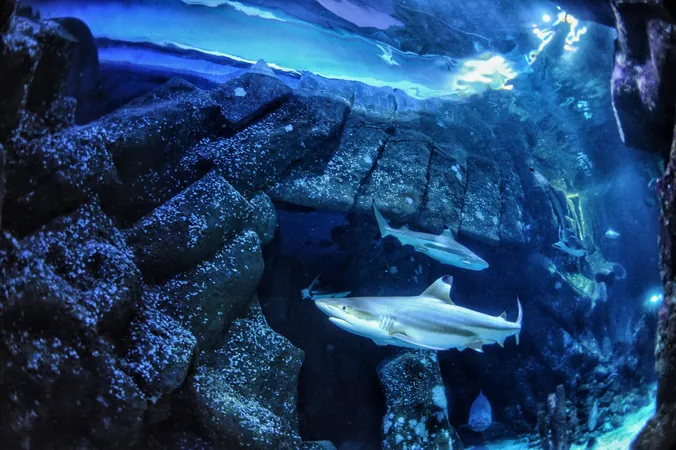
Sharks Threatened: Ocean Acidification May Dull Their Deadly Teeth!
2025-08-27
Author: Noah
A Toothsome Challenge for Sharks
Sharks, the apex predators of our oceans, are renowned for their incredible ability to replace lost teeth. This remarkable adaptation enables them to effectively hunt and consume prey, a crucial aspect of their survival. However, alarming new findings suggest that these toothy titans may be facing a daunting threat from ocean acidification.
Warming Waters, Weaker Teeth
Research from Germany reveals a troubling truth: as our planet warms, and oceans become more acidic, the very teeth sharks rely on could become brittle and less effective. A team from Heinrich Heine University Düsseldorf studied the impact of acidic water on shark teeth, uncovering evidence that these famed hunters may be more vulnerable than previously thought.
"Shark teeth are highly mineralized and built for cutting, not for resisting acid," noted biologist Maximilian Baum. "Our research shows even the most powerful predators can be beaten by nature's evolving challenges."
The Acidic Reality
Ocean acidification occurs when the pH levels of our waters drop due to human-generated carbon dioxide emissions. Currently averaging a pH of 8.1, projections warn that by 2300 this could fall to 7.3, rendering waters nearly ten times more acidic. This shift poses a significant threat not only to shark teeth but to marine ecosystems at large.
A Deep Dive into Research
In their study, the team examined over 600 discarded teeth from Blacktip reef sharks, testing them in two different pH conditions. The results were striking: teeth subjected to more acidic environments exhibited severe surface damage, including cracks, holes, and increased root corrosion. While they did not grow larger in size, the structural integrity was compromised, potentially making them more susceptible to breaking.
Implications for Survival
Although this study focused on non-living teeth, it raises crucial questions about living sharks. Could they regenerate stronger teeth, or would it come at a higher energy cost in acidic waters? Blacktip reef sharks, for instance, must swim with their mouths open to breathe, meaning their teeth are constantly exposed to potential damage from lower pH levels.
Experts warn that even modest drops in ocean pH could have devastating effects on shark populations, especially for species that take longer to replicate their teeth.
A Call to Action for Ocean Health
This study highlights the dire need for maintaining the current ocean pH levels to protect these magnificent creatures and the ecosystems they inhabit. The cascading impacts of climate change on food webs emphasize an urgent call to action for preserving marine environments.
Ultimately, our understanding of these complex interactions remains in its infancy. Future research must examine living sharks' resilience to acidification and the ongoing survival challenges they face. It's a stark reminder: the health of our oceans directly influences the fate of its most iconic residents.









 Brasil (PT)
Brasil (PT)
 Canada (EN)
Canada (EN)
 Chile (ES)
Chile (ES)
 Česko (CS)
Česko (CS)
 대한민국 (KO)
대한민국 (KO)
 España (ES)
España (ES)
 France (FR)
France (FR)
 Hong Kong (EN)
Hong Kong (EN)
 Italia (IT)
Italia (IT)
 日本 (JA)
日本 (JA)
 Magyarország (HU)
Magyarország (HU)
 Norge (NO)
Norge (NO)
 Polska (PL)
Polska (PL)
 Schweiz (DE)
Schweiz (DE)
 Singapore (EN)
Singapore (EN)
 Sverige (SV)
Sverige (SV)
 Suomi (FI)
Suomi (FI)
 Türkiye (TR)
Türkiye (TR)
 الإمارات العربية المتحدة (AR)
الإمارات العربية المتحدة (AR)